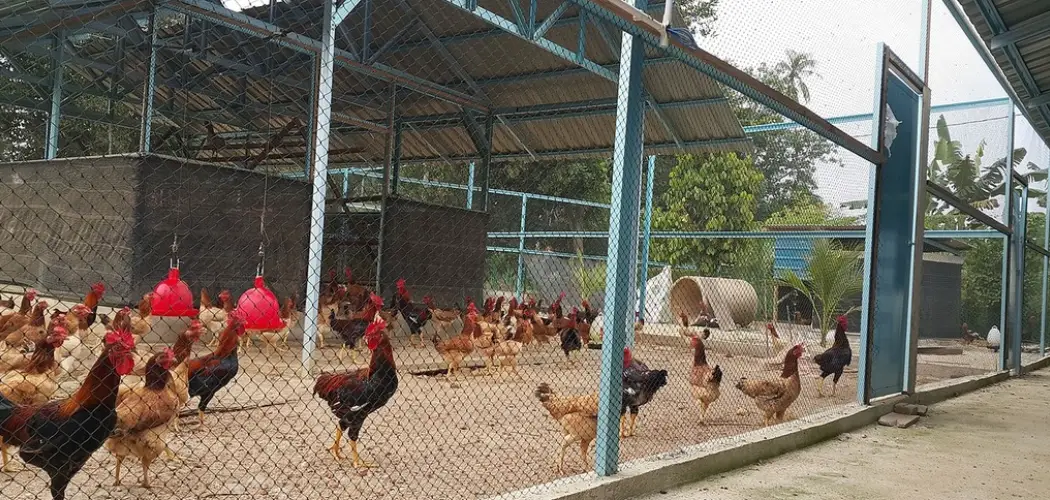Snakes can be a common concern for chicken coop owners, as these reptiles often seek out coops in search of eggs or young chicks. Not only can they pose a risk to your poultry, but they can also cause unease and potential safety concerns for you and your family.
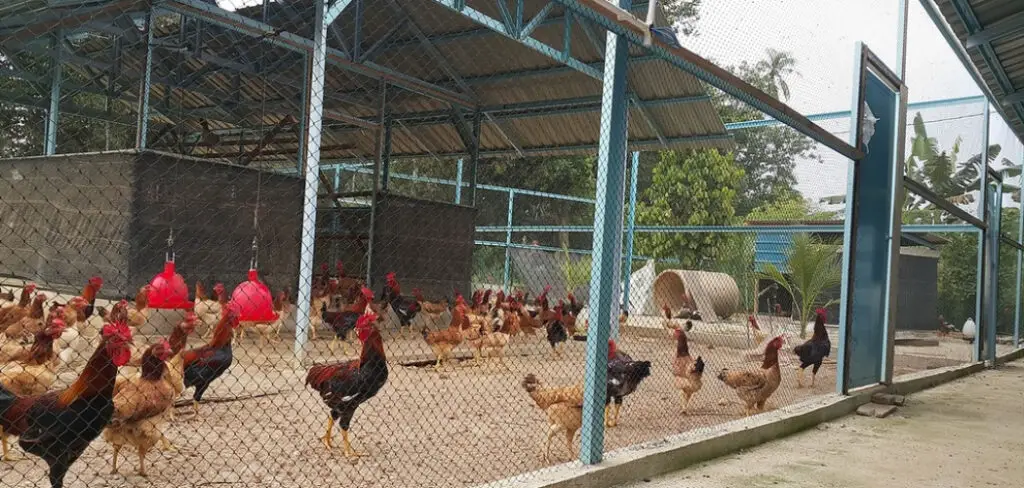
Understanding how to effectively keep snakes out of your chicken coop is crucial for ensuring the safety and well-being of your poultry, as well as providing peace of mind for you as the owner.
In this guide on how to keep snakes out of your chicken coop, we will explore practical steps and preventative measures you can take to create a snake-free environment for your chickens. Whether you’re dealing with non-venomous snakes that pose a threat primarily to your chickens or venomous snakes that could be dangerous to humans as well, you’ll find strategies here to address the issue.
What is Attracting Snakes to Your Chicken Coop?
Before we dive into how to keep snakes out of your chicken coop, it’s important to understand what is drawing them there in the first place. Snakes are attracted to coops for a few reasons, including:
Food Source:
Snakes are opportunistic predators and will take advantage of any potential food source. This includes your chickens, eggs, and even rodents that may be attracted to the chicken feed.
Shelter:
Chicken coops and their surrounding areas can provide a safe and comfortable shelter for snakes. Coops often have crevices, hiding spots, and warm or cool areas that appeal to these reptiles.
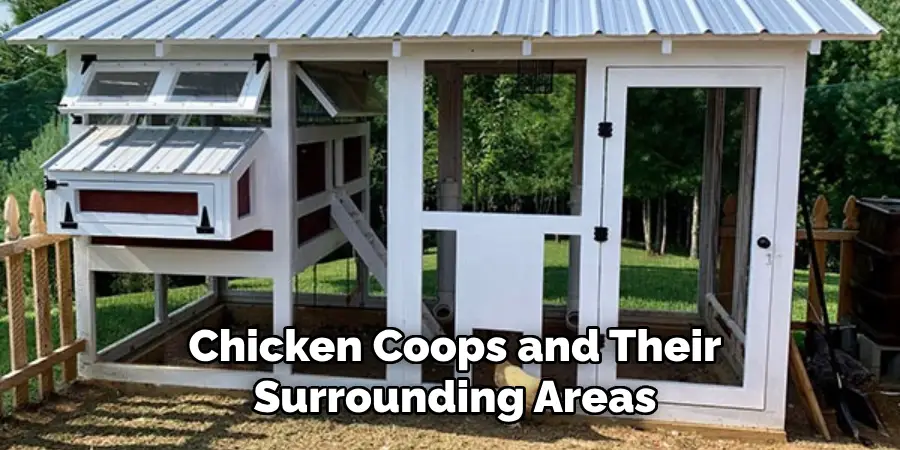
Water Source:
Like all living creatures, snakes need water to survive. If your chicken coop has a nearby water source, such as a pond or creek, it can draw snakes to the area.
Things to Consider Before Implementing Preventative Measures
- Snakes are an important part of the ecosystem and play a role in controlling pests.
- Killing or removing all snakes from your property is not a sustainable solution and can have negative consequences for the environment.
- Some non-venomous snakes, such as rat snakes and king snakes, can actually help keep venomous snakes away.
- If you live in an area with a high population of venomous snakes, it may be necessary to take additional precautions.
- It’s important to do your research and properly identify the types of snakes in your area to determine the best course of action.
- Some preventative measures may also impact other animals, such as birds or beneficial insects. Consider the potential consequences before implementing any strategies.
- Regularly inspecting and maintaining your chicken coop can also help prevent snake infestations.
11 Practical Steps on How to Keep Snakes Out of Your Chicken Coop
Now that you understand why snakes may be attracted to your chicken coop let’s explore some practical steps to keep them out. Here are some measures you can take to create a snake-free environment for your poultry:
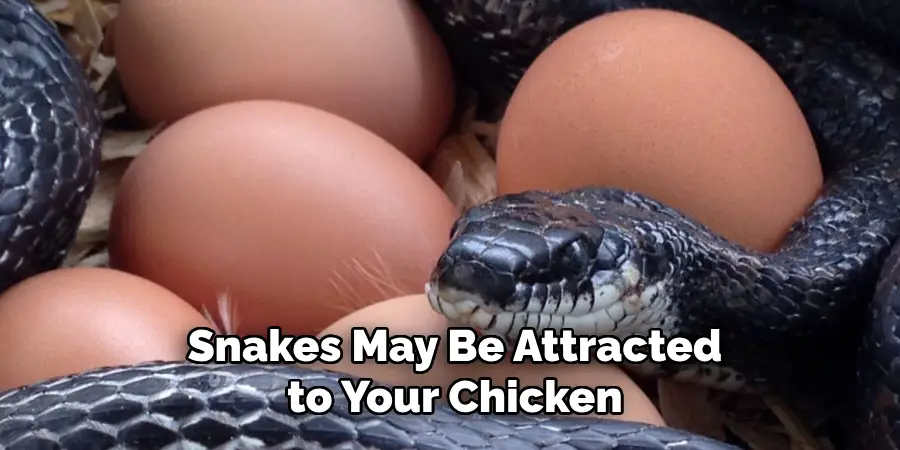
Step 1: Keep the Coop Clean and Tidy
Regularly cleaning and removing debris from your chicken coop is an important first step in snake prevention. Snakes are attracted to areas with clutter, as it provides them with hiding spots and potential food sources. By keeping your coop clean and tidy, you eliminate these attractive features for snakes.
The same goes for the surrounding area around your coop – make sure to keep it free of debris and clutter. But be sure to do so carefully and cautiously, as snakes may already be present in the area.
Step 2: Seal Any Entry Points
Inspect your chicken coop for any holes or gaps that could serve as entry points for snakes. Snakes can fit through surprisingly small openings, so it’s important to carefully inspect and seal any potential entry points. This could include gaps in the walls, floors, or roof of your coop.
The use of hardware cloth or mesh wire is an effective way to seal these openings and prevent snakes from entering. You should also make sure to seal any gaps or holes in the surrounding fencing. You can use a combination of hardware cloth and boards or concrete blocks to create a secure barrier.
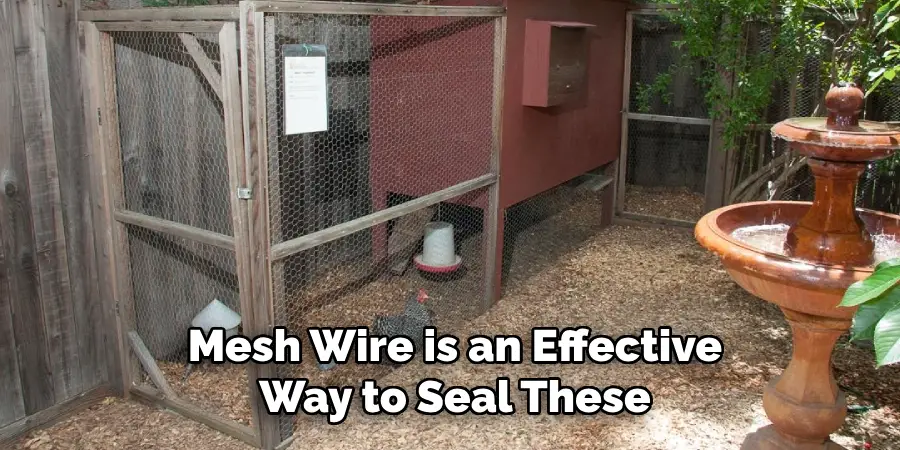
Step 3: Use Snake-Repellent Plants
Certain plants, such as marigolds, lemongrass, and garlic, are known to repel snakes due to their strong scents. Consider planting these around your coop and its surrounding area as a natural deterrent for snakes. Just be sure to do your research on which plants are safe for your chickens to be around.
You can also use essential oils made from these plants to create a spray that you can apply around your coop. But be cautious, as some oils can be harmful to chickens. If in doubt, consult with a veterinarian.
Step 4: Install Snake Traps
For added protection, you may want to consider installing snake traps around your coop. These traps are designed to catch snakes without harming them, allowing you to safely remove and release them elsewhere.
However, make sure to regularly check the traps and properly dispose of any caught snakes. It’s important to note that traps are not a guaranteed solution and should be used in conjunction with other preventative measures. The placement of traps should also be done carefully as to not accidentally trap your chickens.
Step 5: Implement Predator Control Measures
As mentioned earlier, snakes may be attracted to your chicken coop because of its potential as a food source. By implementing predator control measures, such as installing secure fencing or using guard animals like dogs or llamas, you can effectively deter snakes and other predators from targeting your chickens. It’s important to regularly check and maintain these measures as well, as predators may find ways around them.
Step 6: Keep Chicken Feed Secure
Unsecured chicken feed can attract rodents, which in turn can attract snakes. Make sure to store your chicken feed in secure containers that are not easily accessible to pests. This will help eliminate a potential food source for snakes and reduce their attraction to your coop.
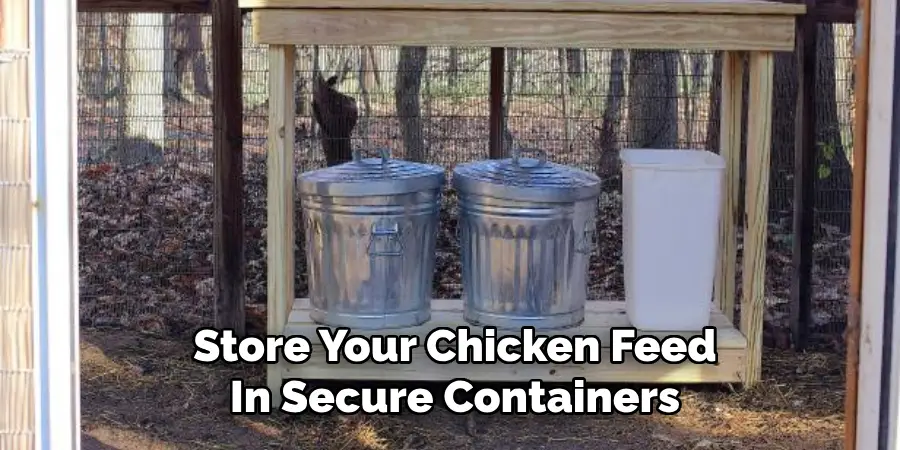
You should also regularly clean up any spilled feed around the coop. But be cautious and avoid handling feed containers if you suspect a snake may be present. The same goes for eggs – make sure to collect them regularly and keep them in a secure location away from the coop.
Step 7: Install Snake-Proof Wire Mesh Around the Coop
In addition to sealing entry points, you may also want to consider installing snake-proof wire mesh around the perimeter of your coop. This will create a physical barrier that snakes cannot easily penetrate. Make sure the mesh is buried at least 6 inches into the ground and angled outward to prevent snakes from burrowing underneath.
You can also use mesh to create a roof for your coop, which will provide added protection from snakes climbing in from above. You can also use mesh to create a roof for your coop, which will provide added protection from snakes climbing in from above.
Step 8: Keep Grass and Vegetation Trimmed
High grass and dense vegetation can provide hiding spots for snakes. Keep the area around your coop well-maintained, with trimmed grass and vegetation. This will also make it easier to spot and remove any potential snake inhabitants.
But be cautious when trimming, as snakes may be present in the area. Consider using a pole trimmer or another tool that allows you to maintain a safe distance. The same goes for any bushes or shrubs in the area – make sure to trim them regularly and keep them from becoming overgrown.
Step 9: Use Motion-Activated Lights or Sound Machines
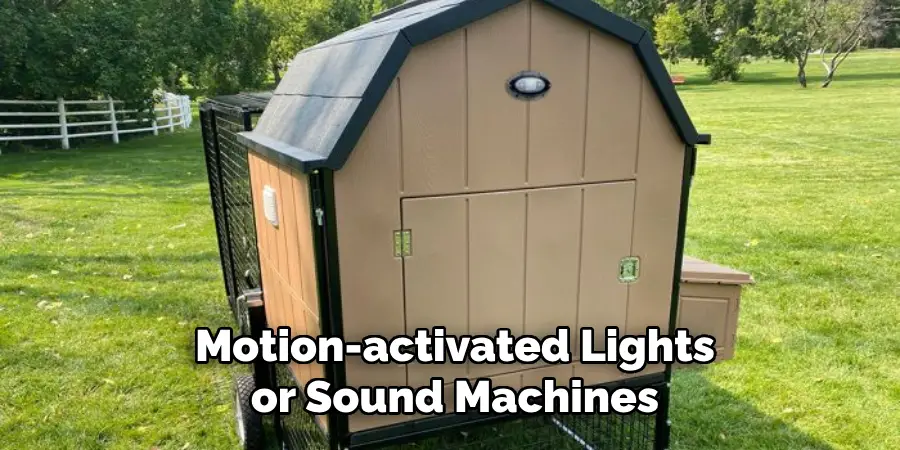
Motion-activated lights or sound machines can be an effective way to deter snakes and other predators from approaching your coop. The sudden light or noise can startle them and cause them to retreat.
You can set these up around the perimeter of your coop or in areas where snakes may be more likely to enter. Just make sure to regularly check and maintain them, as they may stop working over time. The use of these devices can also help alert you to any potential snake activity around your coop.
Step 10: Educate Yourself and Your Family
It’s important for everyone living on or visiting your property to be educated on how to properly identify and handle snakes. Make sure you know what species of snakes are common in your area, which ones are venomous, and how to safely remove them if necessary.
Educate your family and any visitors on the importance of respecting snakes and their role in the ecosystem. It’s also important to teach children to stay away from snakes and not to handle them. By educating yourself and your family, you can safely coexist with snakes while protecting your chickens.
Step 11: Regularly Monitor and Inspect Your Coop
Lastly, it’s important to regularly monitor and inspect your coop for any signs of snake activity. This includes checking for shed skin, droppings, and any potential entry points. By staying vigilant, you can catch and address any snake-related issues before they become a larger problem.
The safety and well-being of your chickens should always be a top priority. By following these preventative measures, you can effectively keep snakes away from your coop and protect your feathered friends. So, it is important to take necessary actions if any potential entry points are identified or suspected.
By following these steps on how to keep snakes out of your chicken coop, you can greatly reduce the likelihood of snakes entering your chicken coop and keep your poultry safe from harm.
Remember to always approach snakes with caution and seek professional help if needed. With proper prevention measures in place, you can create a snake-free environment for your chickens and have peace of mind. So, be aware and take the necessary steps to effectively keep snakes out of your chicken coop. Happy farming!
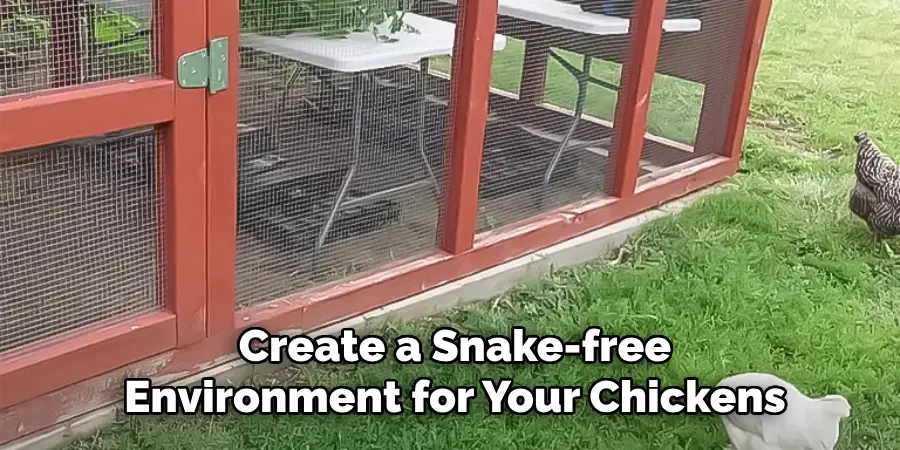
Collaborating with Pest Management Professionals
While taking preventative measures can greatly reduce the chances of snakes entering your chicken coop, it’s also important to have a plan in place in case you encounter a snake. In this situation, it’s best to seek assistance from pest management professionals who are trained and equipped to handle these situations safely and effectively.
They can also provide expertise on additional preventive measures specifically tailored for your property and the type of snakes in your area. By working together with professionals, you can ensure the safety and well-being of both your chickens and yourself. So, do not hesitate to seek professional help if needed!
But remember, ultimately, it is all about creating a balanced and harmonious ecosystem on your property. Snakes play an important role in the environment by controlling rodent populations and should be respected and protected. By taking these preventative measures, you can keep both your chickens and snakes safe while coexisting peacefully on your property.
Therefore, always make sure to educate yourself and others on how to safely and humanely handle any snake encounters. With proper knowledge and precautions, you can successfully keep snakes out of your chicken coop and maintain a healthy environment for all.
So, let’s work together towards creating a safe and harmonious environment for all creatures, big and small. So, don’t panic if you spot a snake near your coop – just follow these tips and enjoy your backyard farming experience with peace of mind. Happy farming!
Frequently Asked Questions
Q: What Should I Do if I Find a Snake in My Chicken Coop?
A: If you come across a snake in your chicken coop, it’s important to remain calm and avoid any sudden movements that may startle the snake. Assess the situation and determine if the snake is a potential threat to yourself or your chickens. If you are unsure, it’s best to contact a professional for assistance in safely removing the snake. Do not attempt to handle or harm the snake on your own, as this may lead to injury or death for both you and the animal.
Q: How Often Should I Check for Snake Activity in My Coop?
A: It’s recommended to regularly check your coop for any signs of snake activity at least once a week. This can include checking for shed skin, droppings, and potential entry points. By staying vigilant and addressing any potential issues as soon as possible, you can effectively keep snakes away from your coop. The frequency of checks may also increase during warmer months when snake activity is higher.
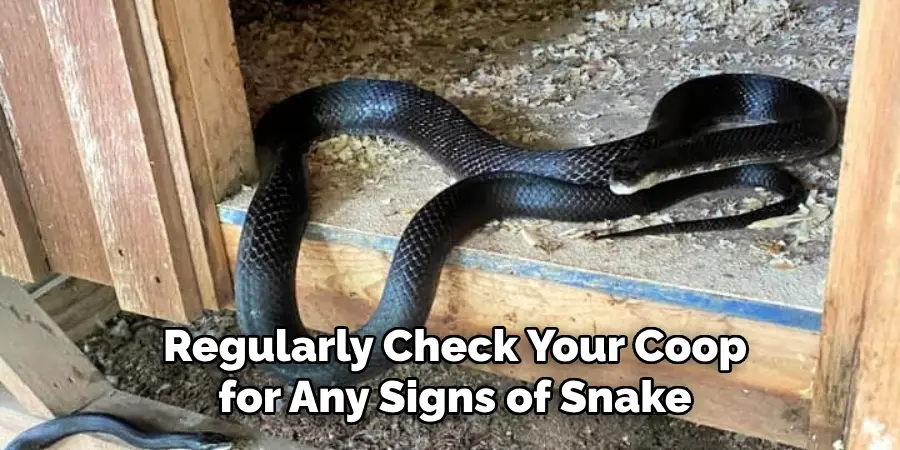
Q: Are There Certain Types of Snakes I Should Be More Concerned About?
A: Yes, it’s important to be aware of the types of snakes that are common in your area and which ones are venomous. For example, if you live in North America, you should be cautious of species such as copperheads, rattlesnakes, and cottonmouths. Educate yourself on the types of snakes in your region and their behaviors to better protect your chickens.
Q: Is It Safe to Use Chemical Snake Repellents Around My Coop?
A: While there are some chemical snake repellents available, it’s important to use them with caution. These products may contain harmful chemicals that can be dangerous for both humans and animals. It’s best to opt for more natural methods of snake prevention, such as sealing entry points and installing physical barriers.
If you do choose to use chemical repellents, be sure to carefully read and follow the instructions provided by the manufacturer. Additionally, consider consulting a professional for advice on safe and effective use.
Q: Can I Use Traps to Remove Snakes from My Coop?
A: It is generally not recommended to use traps to remove snakes from your coop, as this can lead to injury or death for both you and the snake. If you are having trouble with a specific snake repeatedly entering your coop, it’s best to contact a professional for assistance in safely removing and relocating the snake.
Additionally, implementing preventative measures can help reduce the likelihood of snakes entering your coop in the first place. Remember that snakes play an important role in the ecosystem, so it’s best to handle them with care and respect.
Conclusion
In conclusion, maintaining a snake-free chicken coop requires a comprehensive approach that encompasses a variety of preventive measures. From sealing entry points and installing snake-proof barriers to keeping the coop area clean and well-maintained, each step plays a crucial role in deterring snakes from making their way into your poultry habitat.
Educating yourself and your family on snake identification and safety is also essential to coexist peacefully with the local wildlife while ensuring the safety of your chickens.
By implementing these strategies, you can significantly reduce the risk of snake intrusions, providing a secure and peaceful environment for your poultry. Remember, vigilance and ongoing maintenance are key to protecting your chicken coop from snakes and other predators. Thanks for reading this article on how to keep snakes out of your chicken coop.
About
Outdoor Fixes is a distinguished figure in the world of Diy design, with a decade of expertise creating innovative and sustainable Diy solutions.
His professional focus lies in merging traditional craftsmanship with modern manufacturing techniques,
fostering designs that are both practical and environmentally conscious. As the author of diy,
outdoorfixes delves into the art and science of outdoorfixes-making, inspiring artisans and industry professionals alike.
Education RMIT University
(Melbourne, Australia) Associate Degree in Design (Outdoor Fixes) Focus on sustainable design, industry-driven projects,
and practical craftsmanship. Gained hands-on experience with traditional and digital manufacturing tools, such as CAD and CNC software.
Nottingham Trent University
(United Kingdom) Bachelor’s in outdoorfixes.com and Product Design (Honors) Specialized in product design with a focus on blending creativity with production
techniques. Participated in industry projects, working with companies like John Lewis and Vitsoe to gain real-world insights.
Publications and Impact
In diy, Outdoor Fixes his insights on indoor design processes, materials, and strategies for efficient production.
His writing bridges the gap between artisan knowledge and modern industry needs, making it a must-read for both budding designers and seasoned professionals.

